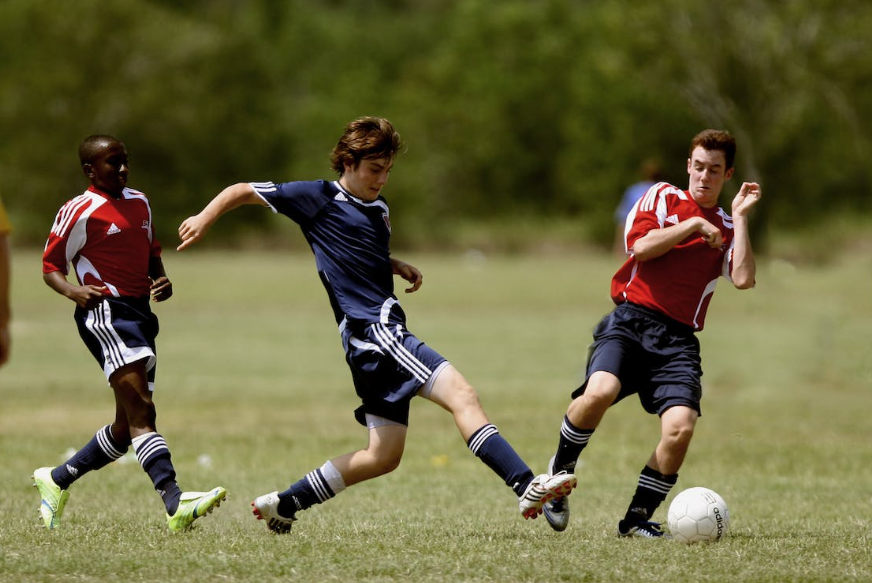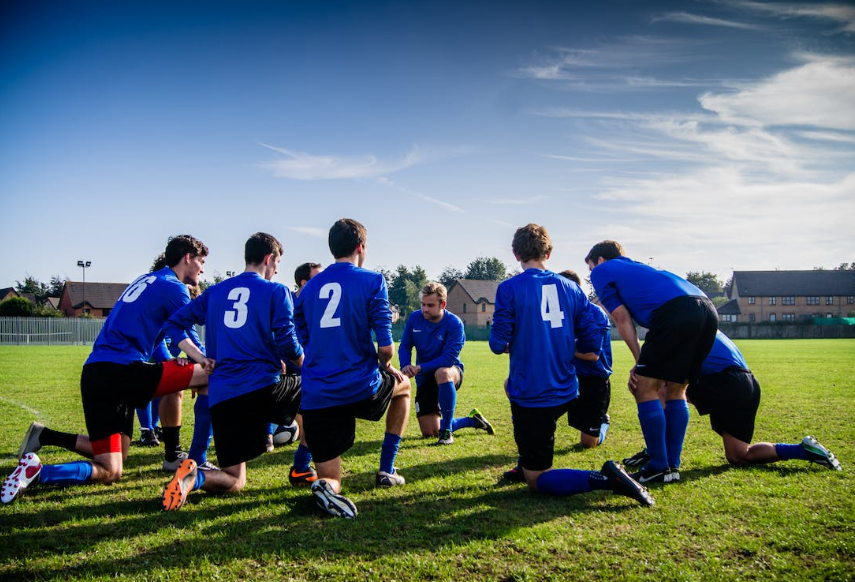How to Develop the Right Football Mindset
There’s an important thing on which a football player should focus on, Mindset. Here are some points to keep in mind are.

Selfpause Affirmation App
Download the app to get 1,000’s of affirmation meditations and everything you need to write, record and listen to your own.
A key to playing football well is having the right mindset. There are two types of mindsets – the growth mindset and the fixed mindset. The growth mindset is the mindset that makes you want to take on new challenges. The fixed mindset, on the other hand, focuses on avoiding failure. The right mindset can make the difference between a successful season and a disastrous one.
Growth mindset

Growth mindset is the belief that a person can change and improve through experience and application. While people may differ in initial talents, aptitudes, interests, and temperament, the mindset says that all these things can be developed with the right kind of application. Individuals with this mindset think that they can achieve whatever they want if they apply their efforts and learn from failures. These values carry over to all aspects of life. They will put forth maximum effort in all that they do and will continue to improve.
Unlike the fixed mindset, the growth mindset focuses on an individual’s ability to improve. A person’s intelligence, skills, and talents are not fixed but can be developed through effort, good teaching, and persistence. This mindset believes that all people can improve and become smarter if they apply themselves and don’t give up easily.
Unlike the fixed mindset, which believes that effort equals less intelligence, a growth mindset believes that effort activates ability. Therefore, people with a growth mindset view challenges as an opportunity to grow. For example, a football player works thousands of hours to acquire muscle memory, technique, and game intelligence. A child with a fixed mindset may think that all his talent has to do with being good at football.
Growth mindset people view their ability as a developable trait and view challenges as exciting and challenging. They also acknowledge that failure is a necessary part of success. Therefore, they do not fear failure.
Fixed mindset

A player with a fixed mindset will not accept feedback or advice. It will view feedback or advice as an attack on their natural talents. This mindset will also result in players alienating themselves from their teammates. This will inhibit their growth as a player. Therefore, it is important for players to be aware of how they can avoid this mindset.
A fixed mindset will not allow a player to achieve his or her goals. Those who have a fixed mindset believe their talent will only get them so far. They do not seek the challenges that would allow them to develop their skills and achieve their goals. They avoid risk and effort because they believe that failure will only humiliate them.
While it is difficult to identify a fixed mindset, there are some traits that can help develop a growth mindset. A growth mindset is a way of thinking that views challenges as opportunities for growth. For instance, a football player will spend thousands of hours developing game-intelligence, technique and muscle memory. A player with a fixed mindset will believe that they are successful football players simply because of their talent.
A fixed mindset is also associated with the belief that natural talent is the only thing that determines success. In a growth mindset, an athlete will accept their weaknesses and use them as a learning opportunity. An athlete with a growth mindset will recognize the differences between their natural ability and the abilities of others and make the necessary adjustments.
Mental stamina

Mental stamina is an important part of a football player’s game. Mental toughness is necessary to stay focused and perform at a high level throughout a game. It helps a player cope with the physical and psychological stress of playing the game. Mental toughness in football is important for players, because they can’t always use all their physical energy to succeed in the game. Mental toughness in football can be developed in a variety of ways.
One of the best ways to develop mental toughness in football is through mental visualization. This technique can be incorporated into your sleep and training routine. Another effective technique is to focus on your own strengths and weaknesses. Comparing yourself to others can be counterproductive and can lead to feelings of being less than ideal. Try to focus on rewarding yourself for your success as well as ensuring your mental toughness.
To identify studies addressing mental toughness, we conducted a literature search of major computerized databases as well as library holdings. We also manually searched reference lists to identify relevant articles. The keywords we used to conduct the search included: mental toughness, sport, and athlete. We found 14 relevant studies.
Imagination

Imagination is a critical skill for football players. This is because they move constantly in order to play the game. Using your imagination can help you get into the game and accept it as an extraordinary world. In fact, you can even use it to improve your social skills. Here are some ways to increase your imagination in football.
The first step in enhancing your imagination in football is to accept the reality of its impossible world. Then, you can use the three regimes of imagination to understand football symbolism. These three regimes involve the construction of possible worlds and symbolic forms. Once you’ve accepted this, the next step is to use your imagination to create your own world, which is the second step in the process of playing the game.
Imagination is a complex phenomenon. Many psychological theories mention imagination as relevant, but there’s very little knowledge about it. This book aims to fill this gap by providing new insights into how humans use their imaginations to learn and solve problems. Through the inclusion of phenomenological and empirical studies, this book offers a new perspective on how the imagination works.
Confidence

Football players have an incredible amount of confidence. In fact, soccer players can speak eleven different languages, yet they can communicate with each other by simply using body language. The same goes for emojis, which are a way to send a message without saying a word. This is the same principle at work in the football mindset.
Confidence comes from past success and experience. You can develop this quality by practicing. You can also gain confidence by overcoming your fears. The best way to improve your confidence is to focus on what you can control. For example, it is crucial to practice if you want to improve your game. Also, you should improve your mental skills by working on your weaknesses and pushing yourself out of your comfort zone.
It is important to build confidence by reminding yourself of your achievements. This includes past games and training sessions, where you did well. Try to remember the games you played well or training sessions when you were on fire. This will give you motivation to do better next time. The key is to stay focused, and to believe in yourself.
Taking yourself out of your comfort zone

Taking yourself out of your comfort zone is key to personal growth. We often stay within our comfort zone because we are afraid of the unknown. This comfort zone can limit our growth and prevent us from exploring new opportunities and exploring our full potential. For instance, if you work in an unsatisfying job, it’s tempting to stay there because you’ll end up disengaged and burnt out. Taking the risk of venturing out, however, can help you achieve a new career path that’s both beneficial and exciting.
Taking yourself out of your comfort zone also gives you confidence. Being confident can help you perform better and overcome mental blocks in situations where you don’t feel 100% prepared. After all, you’ll be competing against bigger, stronger, faster, and more agile players on the other side of the field.
Taking yourself out of your comfort zone is an essential part of personal and professional development. It’s also important to get out of your comfort zone to pursue new opportunities, explore new areas, and meet new people. By taking risks, you’ll learn more, develop your skills, and find new ways to expand your mind.
Before attempting something new, write down your goals. Write down what you want and why. This will give you direction and create a vision for your life. Taking risks can be scary, but it’s important to understand that every new step you take is progress.
Our Top FAQ's
Some key mental attributes that are important for success in football include focus, determination, resilience, confidence, and mental toughness.
A football player can develop a strong mindset by setting specific and achievable goals, practicing positive visualization, staying disciplined and committed to their training, and learning from both successes and failures. Overcoming mental obstacles may also require seeking support from coaches, teammates, and mental health professionals.
Common mental pitfalls that football players should avoid include overthinking, getting too emotional, comparing themselves to others, and focusing on the outcome rather than the process.
A coach can help their players develop the right football mindset by providing clear and consistent expectations, encouraging positive thinking and self-belief, fostering a supportive team environment, and teaching mental skills such as relaxation techniques and goal-setting strategies.
A football player can maintain a positive mindset and stay motivated during tough times on the field by focusing on the present moment, keeping a positive attitude, staying committed to their goals, and seeking support and guidance from their coach and teammates. It can also be helpful to take breaks, engage in relaxation techniques, and practice mindfulness to stay mentally fresh and focused.
